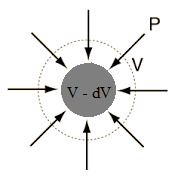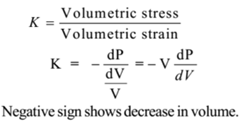Science > Physics > Elasticity > Volumetric Stress, Bulk Modulus of Elasticity
In this article, we shall study the concept of volumetric stress, volumetric strain, and bulk modulus of elasticity.
Volumetric stress:
When the deforming forces are such that there is a change in the volume of the body, then the stress produced in the body is called volume stress. e.g. Solid sphere placed in a fluid under high pressure. Mathematically,
Volumetric Stress = Load / Area = Pressure Intensity = dP
S.I. Unit of stress is N m-2 or Pa (pascal) and its dimensions are [L-1M1T-2]. Units and dimensions of stress are the same as that of pressure.
The internal restoring force per unit area developed in a body when the body is compressed uniformly from all sides is called hydrostatic stress or hydraulic stress.
Volumetric strain:
When the deforming forces are such that there is a change in the volume of the body, then the strain produced in the body is called volume strain.

Mathematically
Volumetric strain = – Change in volume (dV)/ Original Volume (V)
The negative sign indicates the decrease in the volume
The volumetric strain has no unit and no dimensions.
Bulk Modulus of Elasticity:
Within the elastic limit, the ratio of volumetric stress to the corresponding volumetric strain in a body is always constant, which is called as Bulk modulus of elasticity.
It is denoted by the letter ‘K’. Its S.I. Unit of stress is N m-2 or Pa (pascal) and its dimensions are [L-1M1T-2].
Mathematically,

Characteristics of Bulk Modulus of Elasticity:
- Within the elastic limit, it is the ratio of volumetric stress to volumetric strain.
- It is associated with the change in the volume of a body.
- It exists in solids, liquids, and gases.
- It determines how much the body will compress under a given amount of external pressure.
- The bulk modulus of a material of a body is given by
Compressibility:
The reciprocal of bulk modulus of elasticity is called as compressibility. Mathematically
Compressibility = 1 / K
Its S.I. unit is m2 N-1 or Pa-1 and its dimensions are [L-1M-1T2].
Numerical Problems:
Example – 1:
A solid rubber ball has its volume reduced by 14.5% when subjected to uniform stress of 1.45 × 104 N/m². Find the bulk modulus for rubber.
Given: Volumetric strain = 14.5 % = 14.5 × 10-2, Volumetric stress = 1.45 × 104 N/m²,
To Find: Bulk modulus of elasticity =?
Solution:
Bulk modulus of elasticity = K = Volumetric stress / Volumetric strain
∴ K = (1.45 × 104) / (14.5 × 10-2) = 105 N/m²
Ans: Bulk modulus of elasticity of rubber is 105 N/m²
Example -2:
What pressure should be applied to a lead block to reduce its volume by 10% Bulk modulus for lead = 6 × 109 N/m²?
Given: Volumetric strain = 10 % = 10 × 10-2 , Bulk modulus of elasticity = 6 × 109 N/m².
To Find: Pressure intensity =?
Solution:
Bulk modulus of elasticity = K = Volumetric stress / Volumetric strain
∴ Volumetric stress = K ×Volumetric strain
∴ Pressure intensity = K ×Volumetric strain
∴ Pressure intensity = 6 × 109 ×10 × 10-2
∴ Pressure intensity = 6 × 108 N/m²
Ans: Pressure intensity is 6 × 108 N/m²
Example – 3:
A volume of 5 litres of water is compressed by a pressure of 20 atmospheres. If the bulk modulus of water is 20 × 108 N/m². , find the change produced in the volume of water. Density of Mercury = 13,600 kg/m³; g = 9.8 m/s². Normal atmospheric pressure = 75 cm of mercury.
Given: Original Volume = 5 L = 5 × 10-3 m³, Pressure = dP = 20 atm = 20 × 75 × 10-2 × 13600 × 9.8 N/m², Bulk modulus of elasticity of water = 20 × 108 N/m².
To Find: Change in volume = dV =?
Solution:
Volumetric Stress = Pressure intensity = dP
Bulk modulus of elasticity = K = (dP × V)/ dV
∴ Change in volume = dV = (dP × V)/ K
∴ dV = 5 × 10-6 m³ = 5 cc
Ans: The change produced in the volume is 5 cc.
Example – 4:
A volume of 10-3 m³ of water is subjected to a pressure of 10 atmospheres. The change in volume is 10-6 m³. Find the bulk modulus of water. Atm. pressure = 105 N/m².
Given: Original Volume = 10-3 m³, Pressure = dP = 10 atm = 10 × 76 × 10-2 × 13600 × 9.8 N/m², Change in volume = dV =10-6 m³,
To Find: Bulk modulus of elasticity of water =?
Solution:
Volumetric Stress = Pressure intensity = dP
Bulk modulus of elasticity = K = (dP × V)/ dV
∴ K = (10 × 76 × 10-2 × 13600 × 9.8 × 10-3)/ 10-6
∴ K = 1.01 × 109 N/m²
Ans: Bulk modulus of elasticity of water is 1.01 × 109 N/m²
Example – 5:
Two litres of water, when subjected to a pressure of 10 atmospheres, are compressed by 1.013 cc. Find the compressibility of water.
Given: Original Volume = 2 L = 2 × 10-3 m³, Pressure = dP = 10 atm = 10 × 76 × 10-2 × 13600 × 9.8 N/m², Change in volume = dV =1.013 cc = 1.013 × 10-6 m³,
To Find: Compressibility of water =?
Solution:
Volumetric Stress = Pressure intensity = dP
Bulk modulus of elasticity = K = (dP × V)/ dV
∴ K = (10 × 76 × 10-2 × 13600 × 9.8 × 2 × 10-3)/(1.013 × 10-6)
∴ K = 2 × 109 N/m²
Compressibility = 1/K = 1/ (2 × 109)
Compressibility = 5 × 10-10 m²/N
Ans: Compressibility of water is 5 × 10-10 m²/N
Example – 6:
Bulk modulus of water is 2.05 × 109 N/m². What change of pressure will compress a given quantity of water by 0.5%?
Given: Bulk modulus of water = K = 2.05 × 109 N/m², Volumetric strain = 0.5 % = 0.5 × 10-2 = 5 × 10-3
To Find: Change in pressure = dP =?
Solution:
Volumetric Stress = Pressure intensity = dP
Bulk modulus of elasticity = K = dP / Volumetric strain
∴ dP = K × Volumetric strain
∴ dP = 2.05 × 109 × 5 × 10-3
∴ dP = 1.025 × 107 N/m²
Ans: Change in pressure is 1.025 × 107 N/m²
Example – 7:
Calculate the change in volume of a lead block of volume 1 m³ subjected to pressure of 10 atmospheres. Also calculate compressibility of lead. 1 atm = 1.013 × 105 N/m², K = 8 × 105 N/m².
Given: Original Volume = 1 m³, Pressure = dP = 10 atm = 10 × 1.013 × 105 N/m², Bulk modulus of elasticity = K = 8 × 109 N/m².
To Find: Change in volume = dV =? Compressibility = ?
Solution:
Volumetric Stress = Pressure intensity = dP
Bulk modulus of elasticity = K = (dP × V)/ dV
∴ Change in volume = dV = (dP × V)/ K
∴ Change in volume = dV = (10 × 1.013 × 105 × 1)/ 8 × 109
∴ dV = 1.27 × 10-4 m³
Compressibility = 1/K = 1/ (8 × 109)
Compressibility = 1.25 × 10-10 m²/N
Ans: Change in volume is 1.27 × 10-4 m³ and
compressibility of lead is 1.25 × 10-10 m²/N
Example – 8:
Find the increase in the pressure required to decrease volume of mercury by 0.001%. Bulk modulus of mercury = 2.8 × 1010 N/m².
Given: Volumetric strain = 0.001% = 0.001 × 10-2 = 10-5, Bulk modulus of elasticity = 2.8 × 1010 N/m².
To Find: Pressure intensity =?
Solution:
Bulk modulus of elasticity = K = Volumetric stress / Volumetric strain
∴ Volumetric stress = K ×Volumetric strain
∴ Pressure intensity = K ×Volumetric strain
∴ Pressure intensity = 2.8 × 1010 × 10-5
∴ Pressure intensity = 2.8 × 105 N/m²
Ans: Pressure intensity is 2.8 × 105 N/m²
Example – 9:
A solid brass sphere of volume 0.305 m³ is dropped in an ocean, where water pressure is 2 × 107 N/m². The bulk modulus of water is 6.1 × 1010 N/m². What is the change in volume of the sphere?
Given: Original Volume = 0.305 m³, Pressure = dP = 2 × 107 N/m²², Bulk modulus of elasticity = K =6.1 × 1010 N/m²
To Find: Change in volume = dV =?
Solution:
Volumetric Stress = Pressure intensity = dP
Bulk modulus of elasticity = K = (dP × V)/ dV
∴ Change in volume = dV = (dP × V)/ K
∴ Change in volume = dV = (2 × 107 × 0.305)/ (6.1 × 1010)
∴ dV = 10-4 m³
Ans: Change in volume = 10-4 m³
Related Topics:
- Classification of Materials
- Longitudinal Stress, Strain, and Young’s Modulus of Elasticity
- Numerical Problems on Stress, Strain, and Young’s Modulus of Elasticity
- Numerical Problems on Poisson’s ratio
- Numerical Problems on Compound Wires
- Behaviour of Ductile Material Under Increasing Load
- Shear Stress, Shear Strain, and Modulus of Rigidity
- Strain Energy
2 replies on “Bulk Modulus of Elasticity”
Good work done to this site
Nice I learn from this website only